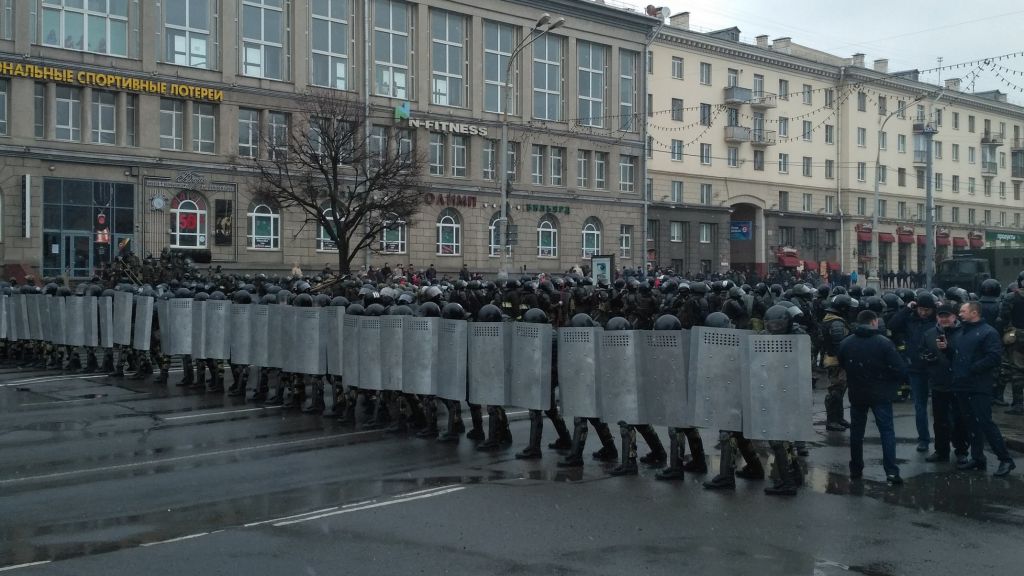Tatsiana Reviaka, President of the Belarusian Human Rights House, gave her account of the recent repression of peaceful protestors in Belarus. These protestors were voicing their opposition to a new law that would see those without work punished as ‘social parasites.’ Reviaka was detained on 26 March along with protestors, and was later released.
“The authorities wanted to demonstrate power and strength, to spread fear among people for their lives and health; they wanted to show that they control everything and everyone and that they are ready to use any means to protect themselves,” she continued.
The UN Special Rapporteur on Belarus, Miklos Haraszti, has called claims of progress on human rights in Belarus “lipstick measures on a face of violations.” In recent days, the make-up has been very much removed and the true face of systematic repression in Belarus revealed.
On 25–26 March, the Belarusian authorities arrested and in some cases violently attacked peaceful protestors, in Minsk and across the country. More than 700 people were arrested, and around 100 people were held overnight, many of whom now face administrative charges in the courts. This comes after the arrest of 300 people in connection with protests from 3–24 March.
Human Rights House Foundation (HRHF) repeats its call for the authorities to immediately release all people still detained, including human rights defenders, journalists, and peaceful protestors, and to withdraw all charges and sanctions against them.
Arrests of protestors were preceded by preventative detentions to stop reporting and monitoring. Police raided the offices of human rights organisation Viasna, arresting 57 people. This included local and international observers and representatives of foreign media and human rights organisations, such as Macha Chichtchenkova of Frontline Defenders, Aleh Hulak chairman of the Belarusian Helsinki Committee, and Viasna’s lawyer Anastasiya Loika. While all 57 people were released later that day, one of the detainees, Aliaksei Loika, was taken to hospital after he was beaten by riot police during the raid. According to the the Belarusian Association of Journalists, around journalists were detained or beaten over the weekend.
“The authorities did not want journalists to show the true picture of what is happening; observers couldn’t monitor it and human rights defenders couldn’t provide necessary assistance,” commented Tatsiana Reviaka.
“These events show that nothing has changed in Belarus. The authorities are still free to drive brutal, systematic, and widespread repression against critical voices at any given time,” commented Florian Irminger, Head of Advocacy at HRHF. “The so-called progress on human rights in the country has not happened. The international community must acknowledge this, renew its attention on Belarus, and engage strongly in supporting Belarusian civil society in its work.”
As one of many alarming cases over the weekend, Paval Levinau was arrested – despite holding an observer badge as part of his work monitoring peaceful assembly on behalf of the Belarusian Helsinki Committee – along with human rights defenders Kastus Mardzvintsau and Leanid Svetsik (both working for Viasna). Paval Levinau fell ill while in detention with high blood pressure and is now in hospital, but still faces administrative charges.
Another case is that of opposition leader Mikalai Statkevich, who was arrested and held incommunicado in KGB detention for almost three days. “This gives a sense of the impunity in the country, that the authorities, from the very top, can decide the fate of an opposition leader as they wish,” added Florian Irminger.
The UN Special Rapporteur on Belarus, Miklos Haraszti, has called on the Belarusian authorities to “stop acts of violence and harassment, and to respect the freedom to peacefully assemble.” HRHF urges the Human Rights Council to show strong support in June for the renewal of the mandate of the Special Rapporteur on Belarus, the only independent international mechanism to systematically monitor human rights in Belarus.
This past year, the European Union has sought to improve relations with Belarus, despite no signs of meaningful improvement in the human rights situation in the country.
“The European Union must set clear benchmarks in its relations with Belarus, to ensure reforms that protect fundamental freedoms. Without such benchmarks, the European Union will continue to be played by so-called liberalisation, or in other words, President Lukashenko’s window-dressing,” Florian Irminger added.
Documents:
- Briefing note on Belarus April 2017: A system that allows human rights violations at any given time
This April 2017 briefing note on Belarus was prepared by Human Rights House Foundation with the support of the Barys Zvozskau Belarusian Human Rights House. - Belarus: Civic solidarity movement condemns mass detentions and police violence against peaceful demonstrators, calls for a strong reaction by the international community
- Belarus: Prominent human rights defender detained as protests continue
- Open Letter to the President of the Republic of Belarus, Alexander Lukashenka
- Stop whipping up hysteria and atmosphere of fear in the Belarusian society
- Belarus detains dozens amid “social parasite” protests
- Belarusians protest against the “tax on parasitism”
Articles on Belarus
The Barys Zvozskau Belarusian Human Rights House
The Belarusian Human Rights House (HRH) addresses the main challenges faced by human rights activists in Belarus – the right to assembly and freedom of expression. This is achieved through the provision of a safe training and meeting space and facilities for human rights defenders, NGOs, journalists, students and teachers, as well as for international meetings and cultural events. Read about and news from the organisations:





